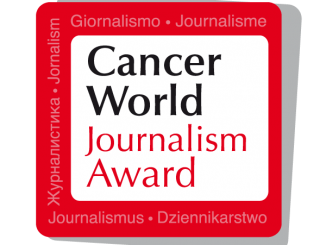Vytenis Andriukaitis talks to Cancer Worlds Anna Wagstaff about what Europe needs to do to safeguard and extend access to high-quality cancer care in challenging times.
How can European countries provide a rapidly rising number of patients and survivors with the treatment and care they need when governments are cutting health spending? They can’t, says European Health Commissioner Vytenis Andriukaitis.
A surgeon by profession, and former Lithuanian Health Minister, he says he is unhappy that, in response to the financial crisis, some governments raided their health budgets as part of their efforts to cut public spending, and argues that such a policy is counterproductive.
“The message is clear: The healthcare system creates conditions for jobs and the economy to recover, and spending on health must be seen as an investment… Investment, investment, and once again investment is the way to fight against cancer,” he told Cancer World.
It’s an important message to get across, particularly as these healthcare cuts are often perceived as a response to pressure from Europe, which in the wake of the financial crash is taking a tougher line on policing the size of the budget deficits run by Member States.
Less widely known is that the Commission now also makes an annual review of how governments’ economic plans align with the EU 2020 strategy for “a smart, sustainable and inclusive economy” – and since 2012, this review has included health spending. This means that the Commission can, and does, now make explicit recommendations in relation to national health systems, which gives added weight to the strong message from the Health Commissioner about increasing investment.
The Vilnius Declaration
Though Andriukaitis only joined the Commission in 2014, he nonetheless played a key role in discussions about what type of health services recommendations from the Commission should be aiming for.
In his capacity as Health Minister, he hosted a European conference in Vilnius during the 2013 Lithuanian EU presidency, which issued a call for European leaders to work with governments and civic society to “help ensure that European health systems are people-centred, sustainable and inclusive and deliver good health for all”.
The Vilnius Declaration called for: increased investment in health promotion and disease prevention; universal access to high-quality, people-centred health services; and healthcare policies that are based on evidence and focus on cost-effectiveness, sustainability and good governance.
Having now become one of those European leaders to which the Vilnius Declaration was directed, Andriukaitis says that the Commission did respond to the call for action and took up many of the Vilnius recommendations in its 2014 ‘Communication on effective, accessible and resilient health systems’. For him personally, the declaration, he says, served as a source of inspiration when framing his own priorities as Health Commissioner – particularly his focus on “Prevention, promotion and protection.”
Equal access
For people with cancer, however, particularly in countries with the poorest outcomes, it’s the Vilnius call for “universal access to high-quality, people-centred health services” that is of real interest. What can Andriukaitis do for them?
“That part of the Declaration was primarily addressed to Member States,” says the Commissioner, “because access to healthcare falls mainly under their competence.” There are, however, ways in which the Commission can help, he adds. “Inequalities between social groups both within and between Member States, lie behind a lot of the gaps in outcomes. From our side, the Commission is ready to be more active in cooperating with Member States in raising issues, especially relating to social determinants, advising them to pay more attention to disadvantaged groups, to evaluate needs and properly implement their national cancer programme.”
There are funds available to help with this, he adds. “You can use European social and investment funds for activities that reduce health inequality between regions and social economic groups, including the development of healthcare infrastructure, health promotion, e-health solutions and better training for the health workforce.”
He mentions also the proposal for European Reference Networks, which should improve access to expert care for people with more rare cancers.
Andriukaitis recognises, however, that the high costs of ‘personalised medicine’ pose a serious challenge to the principle of equal access, and stresses the need to find a way of dealing with this “without discrimination against patient access to healthcare or undermining the cost-effectiveness, resilience and sustainability of Member States’ health systems”.
“The high costs of personalised medicine pose a serious challenge to the principle of equal access”
The Commission, he says, is backing efforts to generate reliable, timely, transparent and transferable information that Member States can use to evaluate the cost-effectiveness of new therapies. It will shortly be introducing a permanent mechanism to oversee this work, which, since 2006, has been led by EUnetHTA on a project-by-project basis.
Affordability
Better health technology evaluation, however, cannot by itself resolve the problem that the prices of many new therapies are simply unaffordable for many European healthcare systems – what can the Commission do about that?
“Negotiating prices of medicines and their inclusion in health insurance systems is the responsibility of Member States,” Andriukaitis responds, and “any action on this front will be done voluntarily and without prejudicing international competencies.” He adds, however, that he is “keen to foster discussions and support cooperation between Member States in these areas, so as to make medicine more accessible to patients.”
He mentions, in particular, moves by Belgium and The Netherlands to start exchanging information about the prices they pay for drugs. Luxembourg is now interested in joining the initiative, says Andriukaitis, and the government has indicated that it is keen to address the cost issue within the wider discussions it is promoting on personalised medicine during its EU presidency, which will continue until the end of 2015.
Andriukaitis mentions also discussions between Romania and Bulgaria about cooperating to address the cost of drug prices, and says he is optimistic about making progress. “When I started in debates with Member States in 2012 and 2013, there was a lot of resistance from many, many countries [about cooperating over negotiating drug prices]. But after 2013, I see the hesitation is rapidly changing, especially relating to new medicines, which are attractive but very costly… I would like to propose an open method of cooperation in this field, and to encourage Member States to be more active.”
Reducing the burden
Important though all these measures are, Andriukaitis argues that the biggest contribution to improving access to high-quality care will have to come from effective action on prevention, which will free up resources by reducing the overall burden of ill health.
“Effective action on prevention will free up resources to improve access to high-quality care”
He suggests that it is in the preventive setting that the personalised approach to medicine could have the greatest impact, by improving targeting of actions. “Personalisation will change prevention programmes for obesity and cancer,” he says, and mentions, in this respect, the work being done by the current Joint Action on Cancer Control, which includes looking at public health genomics and the use of genetic testing in population screening.
He also stresses the importance of including health considerations in every aspect of government policy: education departments should be investing in PE teachers, transport departments in improving bike lanes – while departments of industry should include the health costs of alcohol, tobacco and unhealthy foods when calculating the overall economic contribution from these industries.
“We are ready to discuss with Member States our ideas on a comprehensive approach to managing alcohol, tobacco, nutrition, overweight, obesity, and other risk factors within some framework of actions, and encourage Member States to cooperate on this between themselves and with the Commission,” he says.
He is aware, he adds, of the concerns that have been expressed by some health NGOs, including the European Public Health Alliance and the Standing Committee of European Doctors, that the current Commission is prioritising the interests of economic growth over health – concerns that came to a head in June when the NGOs walked away from the EU Alcohol and Health Forum, calling it “a free PR front for the industry”.
Steps have since been taken to improve the way the Forum functions, says Andriukaitis, and the Commission fully backs the work of the Committee on National Alcohol Policy and Action, and the Joint Action to Reduce Alcohol-related Harm. He mentions, too, the EU Health Policy Forum, which he is in the process of relaunching, and which will provide a valuable platform for all health-related NGOs, he says, including those working on alcohol-related harm.
Staff shortages: a test for European solidarity
Giving added urgency to the goal of reducing the burden of ill-health are projections from the Commission of a shortfall of two million healthcare professionals and ancillary workers by 2020.
Coming as he does from Lithuania, Andriukaitis is only too aware of what this could mean for poorer Member States, many of which are already struggling to retain staff that have trained within their system, but choose to work abroad.
Can the Commission help find solutions that will work for all Member States?
“Sustainability of health systems is of course impossible without sufficient and adequately trained health workers,” Andriukaitis replies, and he refers to a 2012 action plan drawn up by the Commission, which focuses on encouraging Member States to cooperate by developing effective recruitment and retention strategies; increasing evidence-based policy making in workforce planning; recruiting according to the WHO code of practice on international recruitment; and anticipating the skills needed for the future.
“We understand there is a huge challenge for all of us to cooperate in those fields,” he says. “Labour mobility is a fundamental principle in the European Union, but solutions need to be found at national level, with the possible support of bilateral agreements.”
“Labour mobility is a fundamental principle in the EU,but solutions need to be found at national level”
Does he worry about whether there is a sufficient sense of solidarity within today’s EU, particularly given the cracks over the Greek bailout talks, for governments to make the effort to abide by the WHO code of practice, which requires richer countries to take into consideration the needs of poorer Member States vulnerable to health workforce shortages?
“I don’t believe in any crisis and Brexit and Grexit and so on,” says Andriukaitis. “It creates problems in public opinion, but I see most of the European Union as more integrated, more strong, and more efficient, and my belief stems from my practice,” he says.
Europe’s record in collaborating on fighting cancer, he believes, speaks for itself. “In September we will celebrate 30 years of EU action on cancer. Can you imagine? In 1985 Europe Against Cancer was launched, and today it’s good that we still see possibilities to cooperate.
“You can see the huge progress that has been made, and can you imagine how we could keep moving forward without a more integrated approach, without seeing better conditions for partnership at a European level, better options for opening doors, using the open method of coordination to encourage prevention actions across the European Union as a whole?”
“The lead shown by the cancer community,” he adds, “is an example I would like to see followed by others.
“I want to help Member States better identify areas of improvement in public health, a better analysis of public health data. We need more targeted approaches and easier identification of tools, Joint Actions, best practice exchange, targeted interventions, to improve the areas where the burden is highest.
“An example is a more focused approach to chronic diseases, which we hope to launch later this year. I also want to promote a more intensive discussion with stakeholders on public health issues, and I intend to relaunch the EU Health Policy Forum in the coming months, which should give easy access to information for civil society and personal and professional groups across the EU, and encourage their input into our efforts to improve citizens’ health.”
To the uninitiated, this may sound like a list of talking shops. But if Europe is going to find solutions that work for all its Member States to providing high-quality care to a rapidly growing number of patients, when economies are sluggish and the cost of healthcare is escalating, these are the forums where those solutions will need to be mapped out, and where the case championed by Andriukaitis for investing more in healthcare, will need to be made.





